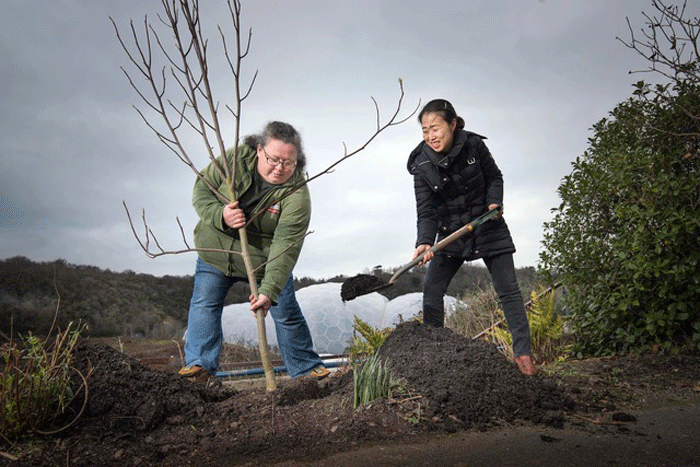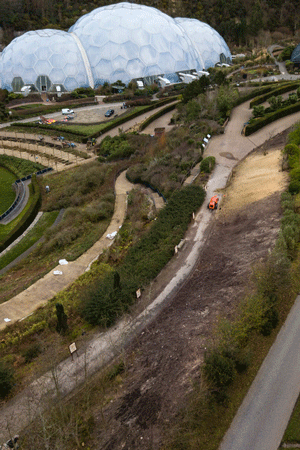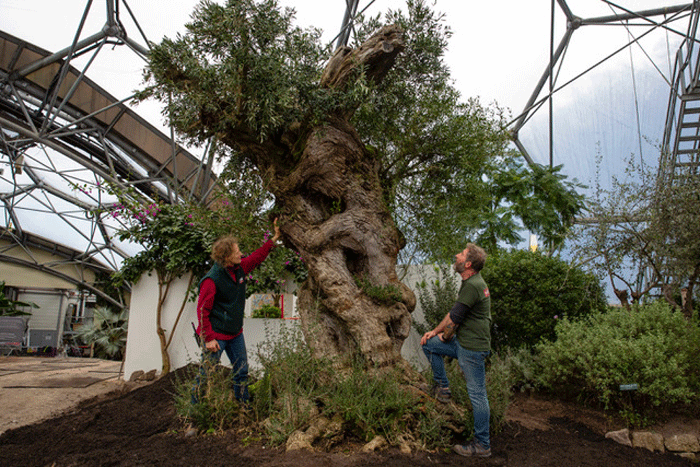Korean Garden for Eden Project
 The Eden Project has started to create what is believed to be the UK’s first Korean garden, themed around the unique plants of the Korean peninsula and the extraordinary reforesting of South Korea over the last 50 years. (pictured above, representative from Korea, Hyeyoung Jin and Garden Lead Hort Julie Kendall, planting the Magnolia Seiboldii tree.)
The Eden Project has started to create what is believed to be the UK’s first Korean garden, themed around the unique plants of the Korean peninsula and the extraordinary reforesting of South Korea over the last 50 years. (pictured above, representative from Korea, Hyeyoung Jin and Garden Lead Hort Julie Kendall, planting the Magnolia Seiboldii tree.)
The installation explores important aspects of the history of the country, including the ability of nature to heal the wounds of war as demonstrated in the demilitarised zone (DMZ) between North and South Korea and how government policy in South Korea has established forests over a nation stripped of forest by the war.
 The new garden will occupy a thousand square metre space on the top edge of the Eden outdoor gardens, close to the visitor centre. It will feature the national flowers of both North and South Korea – Magnolia sieboldii and Hibiscus syriacus respectively.
The new garden will occupy a thousand square metre space on the top edge of the Eden outdoor gardens, close to the visitor centre. It will feature the national flowers of both North and South Korea – Magnolia sieboldii and Hibiscus syriacus respectively.
Eden is creating the garden because the story of plants regenerating an area reflects its own heritage as a former mining site which was barren and sterile before the project was built. South Korea is one of the few countries in the world to have rebuilt its natural capital. Above all, the garden will showcase the spectacular natural flora of South Korea, already the source of many valued plants in UK gardens.
Eden is working with partners at the Korea National Arboretum (KNA) to source plants and seeds and support the design of an authentic and beautiful exhibit. Landscaping work is underway and planting is due to begin in Spring 2019 and it is hoped that the garden will be finished in 2020.
In addition to the new Korean Garden, the Eden Project has just become home to three ancient olive trees removed to make way for younger specimens, situated in the Med garden. Installed in Eden’s Mediterranean Biome, the monumental evergreens are now taking root alongside hundreds of other plants from the climatic region.
 The towering trees (pictured above) are estimated to vary in age between 600 and 1,500 years with the tallest being 3.95 metres (nearly 13 feet) in height. Before Eden discovered them, they had been removed from farms in Alentejo in Portugal and Cordoba in Spain to make way for the planting of younger olive trees.
The towering trees (pictured above) are estimated to vary in age between 600 and 1,500 years with the tallest being 3.95 metres (nearly 13 feet) in height. Before Eden discovered them, they had been removed from farms in Alentejo in Portugal and Cordoba in Spain to make way for the planting of younger olive trees.
Please visit https://www.edenproject.com for visitor information, events and to learn more of the evolving Eden story.
Picture credits: All photographs ©Eden Project 2018. Banner: credit Emily Whitfield-Wicks.

